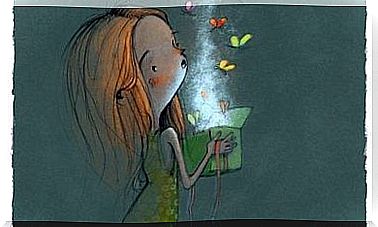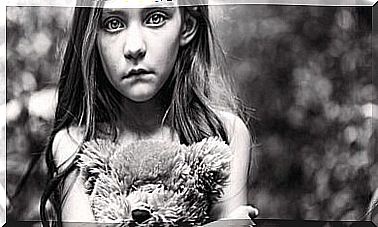Forgetfulness: 3 Lessons We Forget Over The Years

Do you think we forget a lot over time?
Forgetfulness is an interesting phenomenon. It is often anarchic, capricious and almost always faithful to a review, which we learned well during our student years. It is also faithful to the memories we hold within us, full of emotions. It may be the memory of a particular occasion, like the first time we went to the amusement park. Or it may be the memory of several occasions, of all the stories we were told in bed with devotion and patience. Because there is nothing that makes us dream more beautiful than a good story.
Time passes and our grandparents look with concern, but not without joy, at our attempt to grow out of their reach. They see us as small, but at the same time they imagine us as giants. So they search the whole house, looking for a pencil to mark on the wall the proof that we are a little taller today than we were yesterday.
On the way to heaven, we learn that patience usually has more rewards than our impulses. We learn that life can be very beautiful, but that it also keeps surprises hidden around every corner. We see how the sky becomes cloudy, it rains, and then the sun shines again. We also appreciate how nature is a matter of cycles, and realize that many of the processes we go through work in the same way. We discover that kings do not exist, that they are parents, and that parents make mistakes and make mistakes. But we will seldom find something as perfect as their way of loving us.
But we do not just learn, we forget important ideas as time goes on. So, if you feel like it, let’s dive a little deeper into the land of oblivion. Let’s see what we can find !

We forget to negotiate
Children are good dealers. You can bet on that. For them, denial is the main principle of negotiation, something we sometimes forget. They are stubborn, firm and believe in their own potential. They know they have many weapons in their repertoire. The first is to ask for what they want at the right time. When the parents are happier and more flexible, or when the parents are tired and their resistance is lower. Also when their parents are participating in something important, and their priority is to finish the negotiations as soon as possible.
The second weapon is to insist. You so no? Well, I’ll show you the most beautiful “puppy eyes” you have ever seen. You still say no? Then you probably did not take a good look at my face. Look at me! Do you still have the same attitude, hmm? Well, then it’s time to give you a quote. If you give me what I want now, I promise I’ll be kind all day. No results yet? Well, you see, I’ll stay here, standing in the middle of the street, until we take care of this problem with the seriousness it deserves.
Okay, now you’re starting to get nervous. You do not like this situation. I want you to know that I do not like not having what I want either. If you’re trying to pull me over and make me go, I will resist and start using strategies that you would not use, like throwing me on the floor. You are already very nervous because everyone is watching us. Okay, if you threaten me not to go to the park this afternoon, I’ll get up. But first, listen to me, you did not give me what I wanted now, but you promise we’ll go this afternoon, right? Along with my praying eyes, of course.
As adults, we tend to lose the natural tendency to insist. Especially when the negative answer is given to us by other people and not by reality. Sometimes fear, and other times comfort, serve as obstacles to make us accept the answer we already have. They make us send our wishes to the land of oblivion.
We forget to ask when we know nothing
As we grow up, we build an image of ourselves. We do not know for sure how others see us, but we can guess. On the other hand, there are certain properties that we do not want to include in the image we project. We are not liars or manipulators. We are not arrogant. Of course, we are not ignorant either. Or at least we are not more ignorant than other people.
Although our attitude seems to be the multiplication factor of knowledge and social support in our lives, it was a not so distant past where knowledge itself was the most important. For example, knowledge was the only thing to consider for a company when it came to hiring someone. So it was not wise to seem ignorant.
What do children do? They ask more, and more, and more questions. Whether the topic is delicate, interesting or trivial. They want to know how, why, for what reason, what is the origin of it, or what the consequences will be. Just as we do at the bottom of our hearts, they assume they do not know much. But unlike us, they do not understand how questions can affect the clarity of their image. For them, the fascination with knowledge weighs more than their appearance. A fascination that adults usually forget.
We forget to say what we think
It’s nine o’clock. We are almost there, and our legs are shaking a little. How will they be? Will they like us? We should have put on better clothes. Let’s take a deep breath. One two Three…
The door opens and the bride’s mother opens it. She smiles at us, we smile back at her. She invites us to come in and we try not to stumble on the doormat. Some polite questions are asked, and before we know it, after we have stumbled in the conversation a few times, that we are facing a dish we do not like. We do not like it at all. But who would dare to refuse when it is “the house’s specialty”? A dish that the chef prepares so very well. We close our eyes and eat it.
The same situation happens on our second visit. And this time we get a double serving. And just like in this situation, there are many other situations in life where we really have trouble trying not to seem rude. Just because we are afraid to offend others.
A child hardly tolerates a situation they do not like. They do not reject what they think into a land of oblivion, they do not forget their opinions. The natural development in adulthood would be to express this same behavior, but with greater self-control, possibly thanks to the development of the frontal lobe and the assimilation of certain social norms. This means that you take care not to offend anyone.

We forget to seek new experiences
If childhood is characterized by something, it is because it is a time of discovery. The first time we threw an object on the floor and observed what happened to it. The first time we went by ourselves or the first time we were visiting a friend without our parents’ strict vigilance.
The first times not only give the excitement of experiencing them, but also nurture the imagination by fantasizing about them before they happen. We will rarely see a child pass the opportunity to try something new just because they are tired. A child’s curiosity is much more powerful than the coziness of sticking to what they already know. Furthermore, it is true that children are afraid of change, but it is also true that they experience it with passion. Only in rare cases do they put themselves in real danger.









